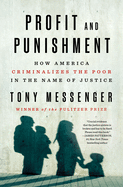
Tony Messenger spent years traveling across Missouri, uncovering the stories of people affected by court fees and fines--work that he calls "the most important work I have ever produced as a journalist." That work, which earned him the 2019 Pulitzer Prize for Commentary, ultimately resulted in Profit and Punishment, a timely and important revelation of "a national crisis hidden in plain sight."
Messenger's work lies at the "intersection of poverty and criminal justice," drawing deeply on the experiences of three single mothers--and a multitude of other individual stories in passing--to illustrate how the justice system has evolved to become a money-making scheme, often "shouldered by the most vulnerable among us." Through court fees and fines, as well as pay-to-stay bills ("board bills") charged in many states for time spent in jail, the system generates income to support itself, "money earmarked by lawmakers as a backdoor tax" and funneled into municipal budgets, sheriff retirement funds, judge and clerk salaries and more. Messenger posits that more than 80% of the cases that go through the court system are for misdemeanor charges, and the vast majority of those paying into the system are living below the federal poverty line.
Messenger grounds relevant data and theory of a broken system in the experiences of those who interact with it. With each case, Messenger drives home the point: this is the criminalization of poverty in action. It's "an American epidemic... [a] tragic cycle of profit and abuse" that should enrage anyone who comes to understand it--and Profit and Punishment is the perfect place to start that understanding. --Kerry McHugh, freelance writer

